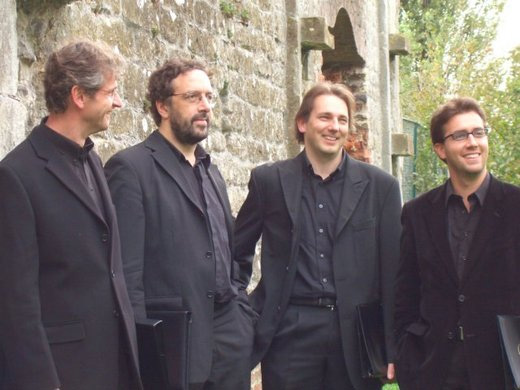
U.S. Tour Gospodi
Since 30 years the vocal quartet Gospodi has become a landmark in Belgium and Europe: four male voices that sing the mystical a cappella psalms, hymns and prayers of the Slavic-Byzantine churches in an atmosphere of simplicity and tenderness.
Great choral works by composers such as Tchaikovsky, Bortniansky and Arkhangelsky are performed by Gospodi in quirky and subtle harmonies inviting their listeners to concede to meditation and … silence.
The meticulous selection of compositions required diligent research in a religious world that wasn’t always easily accessible. In the course of dominating the pronunciation, translating the liturgical texts and correctly interpreting the music, Gospodi closely got to know Slavists, priests and monks who were able to assist and advise Gospodi in these matters.
Since 2005, the quartet is composed of Pieter Stevens (alto), Michaël Wittoek (tenor), Wenceslaus Mertens (baritone) and Frederik Meireson. Gospodi performs on a regular base in Belgium and abroad and has published four cd’s over the last few years. In 2012 Gospodi recorded the soundtrack of the film “Kid” by the Flemish scriptwriter-director Fien Troch.
In Church Slavonic, “Gospodi” means “Lord”. The “Gospodi pomiluy”, “Kyrie eleison” or “Lord, have mercy” also known as the “Jesus prayer” plays an important role in the Byzantine Liturgy, as a way of the people to continuously invoke God and to participate in the prayers said by the deacon or priest.
The logo of the Gospodi quartet is a graphical representation of the famous Trinity Icon, painted around 1425 by Andrei Rublev. The icon is also referred to as “Hospitality of Abraham” and is based on the Biblical story in which the Lord, in the form of three angels, visits the Prophet Abraham and his wife Sarah (Genesis 18). This icon is considered to be the perfect representation of God: three angels, who represent the Inconceivable as the Father, the Son and the Holy Spirit.
The oldest hymns of the 4th Century Byzantine Christians were performed unaccompanied and in unison. They sounded similar to the Gregorian chants in the Western Church. From ca. 1300, the orthodox hymns, influenced by the rising western polyphony, gradually became harmonized. In Greece, this was limited to singing along the supporting bass note with an occasional harmonizing effect. In Russia, three- or four-part pieces were sung in a style that remarkably matched the interior of the churches with their magnificent candlelit icons and frescos.
The Gospel of John: “In the beginning was the Word, and the Word was with God, and God was the Word.” inspired the belief of the Eastern Christians that the Word of God could only be interpreted through the human voice, which is why Byzantine church music is performed unaccompanied to this day.
The seclusion and especially the silence of monasteries lead to the development of “the Word being sung”: the psalms and hymns that epitomized Byzantine rite and that later inspired composers such as Bortnjanski, Rimsky-Korsakov, Tsjaikovski and Rachmaninov to contribute to the Slavic Orthodox choral music.
Gospodi takes on the challenge to give the impressive, harmonized choral compositions a personal form and singing style. The austere and simple musical setting contributes to a subtle part-song and creates an aura of inner tranquillity. Also, the circular placing of the singers increases the possibility to continuously explore one another’s vocal differentiations and the deliberate moments of silence during the performance constitute an important part of the concerts and enhance the contemplative atmosphere.
Tour dates:
- Colchester, VT - Chapel of Saint Michael the Archangel (Saint Michael's College): July 27 at 7pm
- Weston, VT - Church on the Hill: July 30 at 8pm
- New York, NY - Church of the Holy Innocents: August 1 at 7pm
